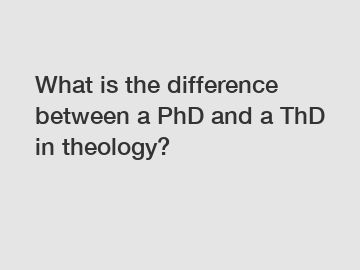What is the difference between a PhD and a ThD in theology?
Getting a doctoral degree in theology is a monumental achievement and a significant commitment of time and effort. However, for many prospective students, the decision of which type of doctoral degree to pursue can be a daunting one. The two most common doctoral degrees in theology are a PhD and a ThD, but what exactly are the differences between them?
A PhD in theology, or Doctor of Philosophy in Theology, is a research-based degree that focuses on academic research and scholarship in the field of theology. This means that students pursuing a PhD in theology will spend much of their time conducting original research, writing scholarly papers, and developing new theoretical frameworks in theology. A PhD in theology is typically seen as a more academic and scholarly degree, focusing on advancing knowledge in the field through research and critical analysis.
On the other hand, a ThD, or Doctor of Theology, is a professional degree that is more focused on practical application and ministry. While students pursuing a ThD will still engage in research and academic study, the emphasis is on how to apply theological knowledge in a real-world setting, such as in a church or other religious organization. A ThD is often seen as a more hands-on and vocational degree, preparing students for leadership roles within their religious communities.

One of the key differences between a PhD and a ThD in theology is the intended career path. Those with a PhD in theology often pursue careers in academia, teaching theology at universities or conducting research in theological studies. On the other hand, those with a ThD are more likely to work in ministry or other leadership roles within religious organizations, such as pastors, chaplains, or church administrators.
Additionally, the curriculum and focus of each degree can vary. A PhD in theology typically includes coursework in research methods, theological theory, and critical analysis, as well as a dissertation or thesis based on original research. A ThD, on the other hand, may include more practical coursework in pastoral care, preaching, and counseling, in addition to theological studies.
The time required to complete each degree can also differ. A PhD in theology typically takes longer to complete, often 5-7 years of full-time study, due to the focus on research and writing a dissertation. A ThD, on the other hand, can usually be completed in 3-4 years, as it is more focused on practical application and may not require as extensive of a research component.
While both degrees can lead to rewarding careers in theology and ministry, it is important for prospective students to carefully consider their career goals and interests when choosing between a PhD and a ThD. Those who are passionate about research, writing, and advancing knowledge in the field of theology may find a PhD to be the best fit for their goals. On the other hand, those who are more interested in hands-on ministry and applying theological knowledge in a practical setting may be better suited for a ThD.
Ultimately, both a PhD and a ThD in theology are valuable and respected degrees that can lead to fulfilling careers in theology and ministry. By understanding the differences between the two degrees and considering their own career goals and interests, prospective students can make an informed decision about which type of doctoral degree is right for them.
If you are looking for more details, kindly visit drone motor wiring diagram, air gear store, 1103 motor.
212
0
0

Comments
All Comments (0)